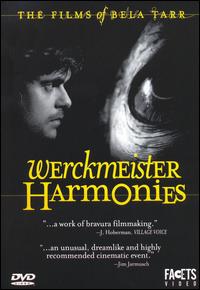- Werckmeister Harmonies
Infobox Film
name = Werckmeister Harmonies

caption = Werckmeister harmóniák
director =Béla Tarr
producer =Béla Tarr
writer = Novel:László Krasznahorkai
Screenplay:László Krasznahorkai
starring =Lars Rudolph Peter Fitz Hanna Schygulla
music =Mihály Vig
cinematography = Patrick de Ranter
editing = Ágnes Hranitzky
distributor =
released = 2000
runtime = 145 min.
rating =
country =Hungary /Italy /Germany /France
awards =
language = Hungarian
budget =
amg_id = 1:201835
imdb_id = 0249241"Werckmeister Harmonies" ("Werckmeister harmóniák") is a 2000 Hungarian film directed by
Béla Tarr , based on the novel "The Melancholy of Resistance" (1989 ) byLászló Krasznahorkai .Shot in black and white and composed of only thirty-nine languidly paced shots, the film describes the aimlessness and anomie of a small town on the Hungarian plain that falls under the fascist influence of a sinister traveling circus lugging the immense body of a whale in its tow. A young man named János tries to keep order in the increasingly restless town even as he begins to lose his faith in the unnatural and disordered universe from which God Himself seems to have disappeared.
The title refers to the baroque musical theorist
Andreas Werckmeister . György Eszter, a major character in the film, gives a monologue propounding a theory that Werckmeister's harmonic principles are responsible for aesthetic and philosophical problems in all music since, which need to be undone by a new theory of tuning and harmony.ynopsis
The story takes place in a small provincial town on the Hungarian Plain. The weather is bitterly cold — twenty degrees below zero - but no snow has fallen. Despite this, hundreds of bewildered people stand around a circus trailer (or corrugated iron box) in the main square, waiting to see the main attraction - the stuffed carcass of a whale. The people composing this faceless, ragged crowd have come from distant parts of the country as well as neighbouring settlements, and the strange state of affairs — the presence of strangers, the extreme cold — is disturbing the order of the small town. Relationships are changing, and some ambitious people feel they can take advantage of the situation; while others who are more passive fall into even deeper uncertainty. The unbearable tension is brought to a head by the figure of the Prince, who is hiding behind the whale; his mere appearance is enough to unleash destructive emotions. The ensuing apocalypse spares no one - not the scientifically-minded outsiders, the teenage enthusiasts, the philistines who care only about their own safety, nor the family — nothing historically privileged by European culture.
Cast
*
Lars Rudolph as "János Valuska"
*Peter Fitz as "György Eszter"
*Hanna Schygulla as "Tünde Eszter"Trivia
* Director
Béla Tarr spent almost a year finding the right square for some scenes in the film.
* During the shooting the temperature dropped to -15 degreesCelsius .
* In September 2007, film criticRoger Ebert added the film to his "Great Movies" list, making it third of only four post-2000 films in the list, the others being Ripley's Game,Pan's Labyrinth , and Babel.External links
*imdb title|id=0249241|title=Werckmeister Harmonies
Wikimedia Foundation. 2010.
